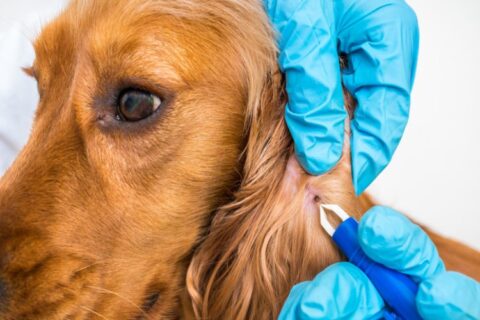Roundworm Infection in Dogs
Roundworms in Dogs Treatment in Campbell & Saratoga, CA
At Reed Animal Hospital serving Campbell and Saratoga, CA, we understand the significance of promptly recognizing and addressing roundworm symptoms in dogs. Roundworms pose health risks to both pets and humans, making it imperative to seek effective roundworms in dogs treatment. Our experienced veterinarians specialize in diagnosing and treating roundworm infestations, ensuring the health and well-being of your furry companion. If you suspect your dog is showing signs of roundworm infection or if you’re seeking guidance on how to get rid of roundworms in dogs, contact us today.
What Are Roundworms?
Roundworms are a type of intestinal parasite commonly found in dogs, cats, and other animals. These worms, known scientifically as ascarids, belong to the genus Toxocara and are typically white or light brown in color and cylindrical in shape. Roundworms can grow quite large, reaching several inches in length, and are often visible in the stool or vomit of infected animals. They reproduce prolifically, laying large numbers of eggs that can contaminate the environment and infect other animals.

Common Symptoms of Roundworm Infection In Dogs
Recognizing the symptoms of roundworm infection in dogs is crucial for timely intervention and treatment. A few common symptoms to watch for include:
- Vomiting – Dogs infected with roundworms may vomit frequently, sometimes containing worms or worm segments, due to irritation in the gastrointestinal tract caused by the parasites.
- Diarrhea – Roundworm infestations can lead to diarrhea in dogs, often characterized by loose, watery stools with mucus or blood, as the worms disrupt normal digestion and absorption of nutrients.
- Potbellied Appearance – Infected dogs may develop a swollen or potbellied appearance, especially in puppies, as the presence of roundworms in the intestines can cause abdominal distension and bloating.
Diagnosing Roundworm Infection
Diagnosing roundworm infection in dogs typically involves a combination of clinical examination and laboratory testing. Veterinarians may conduct a thorough physical examination to assess for symptoms such as vomiting, diarrhea, and abdominal distension. Fecal flotation tests are commonly used to detect roundworm eggs in the stool, providing definitive confirmation of infection. In some cases, additional diagnostic techniques such as fecal antigen tests or direct visualization of adult worms in vomit or feces may be utilized for accurate diagnosis.
Treatment Options
Consulting with a veterinarian is essential for developing a tailored treatment plan that addresses the specific needs of the individual dog. Common treatment options for roundworm infections in dogs include:
Anthelmintic Medications
- Pros – Anthelmintic medications, such as fenbendazole or pyrantel pamoate, are highly effective in killing adult roundworms and preventing re-infestation.
- Cons – Some dogs may experience mild side effects such as vomiting, diarrhea, or lethargy. Additionally, multiple doses may be required to fully eliminate the parasites, and resistance to certain medications can develop over time.
Deworming Protocols
- Pros – Deworming protocols involve administering anthelmintic medications at regular intervals as part of a preventive healthcare regimen, effectively reducing the risk of roundworm infestation.
- Cons – While effective for preventing infestations, deworming protocols may not be sufficient for treating existing infections, especially in severe cases where additional treatment may be necessary.
Environmental Sanitation
- Pros – Thorough cleaning and sanitation of the environment, including regular removal of feces and disinfection of contaminated areas, can help prevent the spread of roundworm eggs and reduce the risk of re-infestation.
- Cons – Environmental sanitation alone may not be sufficient to eliminate roundworm infections in dogs, particularly in cases where the environment is heavily contaminated or where multiple infected animals are present.

How to Administer Medication to Dogs
Administering roundworm medication to dogs typically involves oral administration of anthelmintic medications. These medications may come in the form of tablets, chewables, liquids, or pastes, depending on the specific product. To administer the medication, pet owners should carefully follow the instructions provided by their veterinarian or on the medication packaging. This often involves giving the appropriate dosage based on the dog’s weight and ensuring that the medication is fully swallowed to ensure effectiveness.
Can Humans Get Roundworms From Dogs?
While roundworm infections in dogs are primarily caused by the ingestion of roundworm eggs from contaminated environments or through mother-to-puppy transmission, it is possible for humans to contract certain types of roundworms from dogs. The most common route of transmission is through accidental ingestion of roundworm eggs, often present in contaminated soil, feces, or on the fur of infected animals. Ingested eggs can hatch into larvae in the human intestine, potentially leading to health issues such as visceral larva migrans or ocular larva migrans. Practicing good hygiene, such as washing hands thoroughly after handling dogs or their feces and ensuring regular deworming of pets, can help minimize the risk of roundworm transmission from dogs to humans.
Contact Reed Animal Hospital for Roundworm Treatment Options
Early detection, prompt treatment, and preventive measures are crucial in managing roundworm infections in dogs. At Reed Animal Hospital in Campbell and Saratoga, CA, we emphasize the importance of proactive veterinary care to safeguard the health and well-being of your beloved pets. Our experienced team is equipped with advanced treatment options and medications tailored to combat roundworm infestations effectively. Contact us today to schedule an appointment and take proactive steps toward protecting your pet from roundworm infection.


